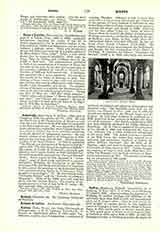

Rolfus, HERMANN, Catholic educationist, b. at Freiburg, May 24, 1821; d. at Buhl, near Offenburg, October 27, 1896. After attending the gymnasium at Freiburg, he studied theology and philology at the university there from 1840 to 1843, and was ordained priest on August 31, 1844. After he had served for brief periods at various places, he was appointed curate at Thiengen in 1851, curate-in-charge at Reiselfingen in 1855, parish priest at the last named place in 1861, parish priest at Reuthe near Freiburg in 1867, at Sasbach in 1875, and at Biihl in 1892. In 1867 the theological faculty at Freiburg gave him the degree of Doctor of Theology. Rolfus did much for practical Catholic pedagogics, especially in southern Germany, by the work which he edited in conjunction with Adolf Pfister, “Real-Encyclopadie des Erziehungsund Unterrichtswesens nach katholischen Principien” (4 vols., Mainz, 1863-66; 2nd ed., 1872-74). A fifth volume (“Erganzungsband”, 1884) was issued by Rolfus alone; a new edition is in course of preparation. Another influential publication was the “Suddeutsches katholisches Schulwochenblatt”, which he edited, also jointly with Pfister, from 1861 to 1867. Of his other literary works, the following may be mentioned: “Der Grund des katholischen Glaubens” (Mainz, 1862); “Leitfaden der allgemeinen Weltgeschichte” (Freiburg, 1870; 4th ed., 1896); “Die Glaubens- and Sittenlehre der katholischen Kirche” (Einsiedeln, 1875; frequently reedited), jointly with F. J. Brandle; “Kirchengeschichtliches in chronologischer Reihenfolge von der Zeit des letzten Vaticanischen Concils bis auf unsere Tage” (2 vols., Mainz, 1877-82; 3rd vol. by Sickinger, 1882); “Geschichte des Reiches Gottes auf Erden” (Freiburg, 1878-80 3rd ed., 1894-95); “Katholischer Hauskatechismus” (Einsiedeln, 1891-92). In addition to the works mentioned, he also wrote a large number of pedagogic, political, apologetic, and polemical brochures, ascetic treatises, and works for the young.
FRIEDRICH LAUCHERT

